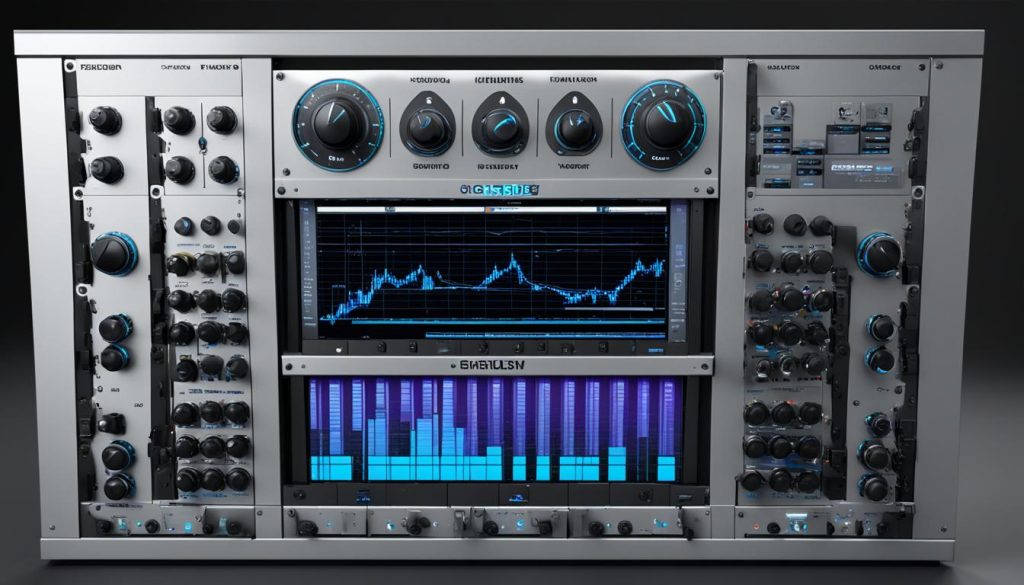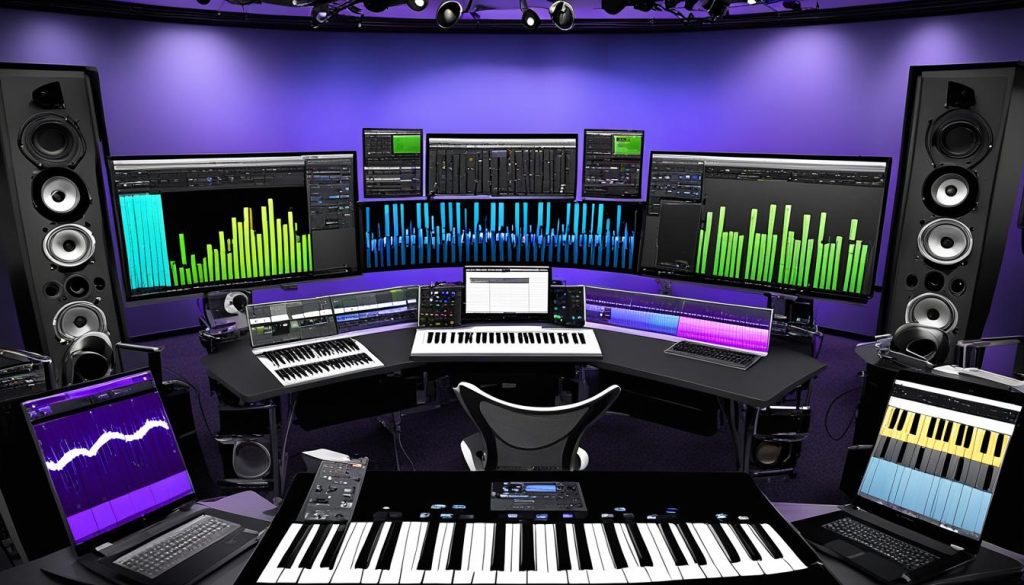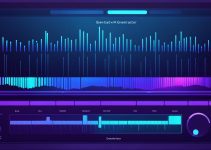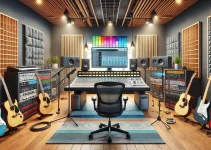Are you ready to take your music-making to the next level in 2024? The world of digital audio workstations (DAWs) and music production software is always changing. This means you have endless possibilities for making amazing music. But, with so many choices, finding the right tool for your music can be tough.
In this guide, we’ll show you the 7 best music production software tools picked by experts. These tools offer smooth workflow and advanced features. They will help you reach your highest potential as a musician, composer, or sound designer. Get ready to start a journey of exploring sounds and bringing your creative ideas to life.
Key Takeaways
- Choosing music production software that works well with different operating systems and hardware is important.
- DAWs with customizable interfaces and workflows make using them more efficient and enjoyable.
- Being able to use many plugins is key for making a wide range of music.
- Managing latency and buffer sizes well is important when working on big projects.
- Good mixing and mastering tools are necessary for making your music sound professional.
Exploring the Realm of Music Production Software
The world of music production has changed a lot, thanks to digital audio workstations (DAWs). These tools let sound engineers do many jobs like composing, playing, recording, and producing music from one computer. Knowing about the music production software evolution and what to look for in a DAW can help you pick the right one for your needs.
The Evolution of Digital Music Creation
Tools for making digital music have changed how we make, record, and share music. From the early days of MIDI to today’s advanced platforms, the industry has always pushed limits. Now, these tools let users try new things with sound.
Key Factors to Consider When Choosing a DAW
Choosing a DAW is important for your workflow and the quality of your music. You should think about these things:
- Compatibility with your devices and operating system
- Customizability of the interface and workflow
- Compatibility with third-party plugins and virtual instruments
- Control over latency and buffer sizes for optimal performance
- The quality and depth of built-in mixing and mastering tools
- Flexibility in exporting audio files in the desired formats
| DAW | Pricing | Free Trial |
|---|---|---|
| Ableton Live | Starts at $99.99 | Available |
| Cubase Elements 13 | $99.99 | Available |
| REAPER | $60 to $225 | 60 days |
| FL Studio | Starts at $99.99 | Limited trial |
| Avid Pro Tools | Starts at $9.99/month | 30 days |
| Logic Pro | $199.99 | 90 days |
By looking at these factors, you can pick the music production software that fits your creative needs and workflow. This will help you bring your musical ideas to life.
Ableton Live: Innovative Session View for Dynamic Creativity
Ableton Live is a top music production software known for its Session View. This view offers a dynamic way to perform and compose music. It combines live performance tools with strong production features, making it a hit with electronic music producers and DJs.
Seamless Blend of Live Performance and Production
Ableton Live’s Session View lets you mix musical ideas easily without a traditional timeline. This means you can experiment and improvise freely. You can start and change clips in real-time, mixing live performance with studio production.
The Capture MIDI feature adds to this creative flow. It lets you record your spontaneous ideas and mistakes to make full songs.
Intuitive Interface and Powerful Features
Ableton Live has an easy-to-use interface, great for beginners. It comes with virtual instruments like Wavetable, Operator, and Simpler for creating sounds. The software also has a big effect library, including the Glue Compressor, Amp, Looper, and Spectral Resonator, to shape your music.
The Warping feature lets you change tempo and timing of audio live without stopping the music. Tempo Following adjusts the tempo of the software to match the audio you’re playing, making it easy to mix with other sources.
For more customization, Ableton Live’s Max for Live lets you make your own devices. You can connect with hardware and software to boost your music production and live shows.
Whether you’re an experienced producer or just starting, Ableton Live’s Session View, easy interface, and strong features are great for making music creatively.
Logic Pro: Apple’s Comprehensive Suite for Professional Results
If you’re into music production and want a top-notch digital audio workstation (DAW), Logic Pro is your go-to. It’s Apple’s top music production software, packed with advanced tools for pro-level results. Plus, it’s easy to use.
Logic Pro has been around for over 35 years, starting on the Atari ST. Apple bought the developer Emagic in 2002 and has updated the DAW several times. The big change came in 2013 with a new single-window design.
Logic Pro 11 is the latest version, offering great features for recording, scoring films, sound design, and post-production. It costs $199.99 for new users but is free for those who already have it. It’s a great deal for its many features.
Logic Pro stands out with its huge sound library. It has over 5,900 instrument and effect patches, 1,200 sampled instruments, and 14,750 Apple Loops in various genres. This means you can make professional-quality music easily.
Logic Pro 11 also brings new features like AI-powered Session Players for keyboard and bass. There’s a new Drummer plugin with more styles and drum mixes. And, the Global Chord Track lets you set chord progressions for your whole project.
| Feature | Specification |
|---|---|
| Audio Tracks | Up to 1,000 stereo audio tracks |
| Instrument Tracks | Up to 1,000 instrument tracks |
| Auxiliary Tracks | Up to 1,000 auxiliary tracks |
| Audio Resolution | Up to 32-bit/192kHz |
| Dolby Atmos Support | Up to 7.1.4 surround sound |
| Storage Requirements | 75GB for full installation |
Whether you’re an expert or just starting, Logic Pro has everything you need for top-quality music production. It’s packed with tools, has a huge sound library, and is easy to use. It’s a top choice for digital music making.
FL Studio: Beat Making and Loop-Oriented Workflows
If you’re into music production and love beat-making, FL Studio is a great choice. It’s a digital audio workstation (DAW) known for its easy pattern-based sequencing and free updates for life. This makes it perfect for beatmakers who like working with loops.
Pattern-Based Sequencing and Lifetime Updates
FL Studio is known for its pattern-based sequencing. This lets you quickly create and arrange beats, melodies, and harmonies. It’s all about musical patterns, not just single notes. Plus, you get free updates for life, so your FL Studio keeps getting better.
Accessible Interface for Beginners
FL Studio is easy to use, even for beginners. It has different versions to fit your budget and skill level. With lots of tutorials and community support, you’ll quickly learn how to use FL Studio’s beat-making and loop features.
| Feature | Description |
|---|---|
| Pattern-Based Sequencing | FL Studio’s intuitive pattern-based workflow encourages experimentation and creativity, allowing you to quickly build and arrange your beats, melodies, and harmonies. |
| Lifetime Free Updates | FL Studio owners receive lifetime free updates, ensuring that your software continues to evolve and improve over time. |
| Accessible Interface | FL Studio boasts an accessible and user-friendly interface, making it a great choice for beginners and professionals alike. |
| Flexible Pricing | FL Studio offers different versions to cater to various needs and budgets, providing options for both hobbyists and professional musicians. |
FL Studio is great for both experienced beatmakers and newcomers. It offers powerful beat-making and loop-oriented workflows. With its pattern-based sequencing and easy interface, it’s a top choice for music producers. Plus, with free updates for life, it keeps getting better.
Cubase: A Powerhouse for MIDI and Virtual Instrument Composition
Cubase is a top choice for composers and music producers who use MIDI and virtual instruments. It’s known for its precise MIDI editing and advanced features. This makes it a key tool in music creation.
Precision MIDI Editing and Advanced Features
Cubase shines with its detailed MIDI editing tools. You can adjust the timing and intensity of notes or create complex arrangements with ease. It also supports 64-bit audio, surround sound, and high-resolution recording up to 192 kHz.
There are three versions of Cubase: Cubase Elements 13, Cubase Artist 13, and Cubase Pro 13. Each version meets different needs and budgets. Cubase Pro 13 is the top version, packed with tools for composing with virtual instruments, editing audio, and mixing and mastering.
| Cubase Version | Price | Key Features |
|---|---|---|
| Cubase Elements 13 | $99.99 | 64 MIDI tracks, 48 audio tracks, 24 instrument tracks, 1,000 sounds, 45 mix and effects plug-ins |
| Cubase Artist 13 | $329.99 | Unlimited tracks, VariAudio pitch correction, Retrologue 2, Padshop 2, 2,600 sounds, 62 effects plug-ins |
| Cubase Pro 13 | $579.99 | 256 VCA tracks, Dolby Atmos support, Control Room, 3,400 instrument sounds, 87 effects plug-ins |
Cubase is a powerhouse for music producers and composers. It offers deep MIDI editing, a wide range of virtual instruments, and advanced mixing and mastering tools.
Reason: Emulating the Experience of Hardware
Reason is a standout in music production software with its unique virtual rack setup. It mimics the feel of real hardware, perfect for those who love a hands-on approach to making sounds. With a wide range of synthesizers, effects, and tools, it encourages users to experiment and shape their sounds.
Virtual Rack Environment for Experimental Sound Design
The virtual rack in Reason makes exploring experimental sound design easy and fun. It lets users get hands-on with routing signals and patching devices. This way, they can find new and exciting sounds they might not have thought of before.
For those used to linear DAWs, the rack might seem different at first. But, Reason’s virtual environment is great for those who enjoy the hands-on feel of hardware. It lets you tweak virtual knobs and cables, opening up new ways to make music.
But, it’s key to remember that Reason might not have all the editing tools other software has. If you need a lot of production features, Reason might not be the best choice. Yet, for those who love the idea of hardware emulation and trying out new sounds, Reason is a great option.

Studio One: Streamlined Workflows for Songwriting
PreSonus Studio One has grown to version 6, bringing new features to make music production easier. It’s perfect for singer-songwriters and bands because of its easy-to-use songwriting tools. The drag-and-drop feature makes creating music a breeze.
Intuitive Drag-and-Drop Functionality
Studio One 6 now has Smart Templates, which replace old Styles. These templates are made for different music projects, like recording and mixing, or rehearsing and performing. They help you start your project faster, so you can get creative right away.
Adding sounds, instruments, effects, and FX chains is easy with the drag-and-drop feature. This lets you focus more on making music and less on complicated settings.
Integrated Mastering Suite and Album Assembly
Studio One 6 has great mastering tools to make your mixes shine. You can easily share your music through partner platforms. The mastering suite and album assembly tools give you everything you need for your projects.
There’s also a Video Track for working with videos. You can trim and extract audio right in your Studio One projects. This makes creating songs or multimedia content smooth and easy.
PreSonus Studio One 6 offers a powerful, easy, and flexible way to make music. It’s great for songwriting, composing, and mixing music and videos together. It’s a top choice for today’s music creators.
Music Production Software: The Industry Standard
Pro Tools is a top choice for music production software. It’s known for its top-notch professional audio editing and mixing capabilities. Many recording studios and audio engineers around the world rely on it.
Its advanced features and wide use make it a top pick for those looking for the best in music production tools. With its detailed editing and mixing tools, Pro Tools lets users make their recordings sound perfect. This is what industry pros want.
Pro Tools might be pricey, either through subscription or a one-time cost. But it’s still the industry standard. Knowing how to use Pro Tools is often needed for audio engineering and production jobs. So, it’s a smart choice for those serious about music production.
Pro Tools is known for its excellence and wide use in professional settings. It’s the top choice for professional audio editing and mixing capabilities. For those aiming for the best, Pro Tools is the go-to software.
Pros and Cons of Pro Tools
- Powerful and comprehensive editing and mixing tools
- Widely adopted as the industry standard
- Requires Avid hardware for certain features and optimal performance
- Subscription or high one-time cost can be prohibitive for some users
| Feature | Pro Tools | Ableton Live | Logic Pro |
|---|---|---|---|
| Audio Editing | ✓ | ✓ | ✓ |
| MIDI Editing | ✓ | ✓ | ✓ |
| Mixing Capabilities | ✓ | ✓ | ✓ |
| Plug-in Support | ✓ | ✓ | ✓ |
| Virtual Instruments | ✓ | ✓ | ✓ |
| Pricing | $99/mo or $599 (one-time) | $99 | $199 |
The music production software world is always changing. But Pro Tools stays the top industry standard. It offers unmatched professional audio editing and mixing capabilities. This keeps it leading in the field.

Conclusion
When you dive into music production software, finding the right digital audio workstation (DAW) is key. It should match your creative style and how you work. Some producers use many programs to get the best out of each one. But, growing as a producer means really getting to know your DAW and improving your skills.
The music production community is full of support and learning tools like online tutorials and courses. These can really help you grow as a producer. To move forward, practice with your DAW often and understand music theory and audio engineering well.
For both experienced pros and new musicians, music production software opens up many ways to be creative and improve your music. Choose the tools that feel right for you, dive deep into making music, and let your creativity soar.
FAQ
What are the key factors to consider when choosing music production software?
What are the strengths of Ableton Live?
What are the key features of Logic Pro?
What are the main advantages of FL Studio?
What are the strengths and challenges of Cubase?
What is unique about Reason’s approach to music production?
What are the key features of Studio One?
Why is Pro Tools considered an industry standard?
Source Links
- Best Music Production Software of 2024 – https://www.usnews.com/360-reviews/technology/best-music-production-software
- Best Music Production Software in 2024 (Cons & Pros) – https://www.linkedin.com/pulse/best-music-production-software-2024-cons-pros-roman-kropachek-sjake
- Title: Unleash Your Musical Potential: Exploring the World of Ableton Live – https://medium.com/@billwalton833/title-unleash-your-musical-potential-exploring-the-world-of-ableton-live-2ee751164fa2
- Best Music Production Software 2024 | Soundscaping Excellence – https://aaftonline.com/blog/best-music-production-software/
- Ableton Live | Ableton – https://www.ableton.com/en/live/what-is-live/
- What’s new in Live 12 | Ableton – https://www.ableton.com/en/live/compare-editions/
- Unleashing Creativity with Ableton Music Software – https://www.hypertribe.com/post/unleashing-creativity-with-ableton-music-software
- Apple Logic Pro Review – https://www.pcmag.com/reviews/apple-logic-pro
- Logic Pro for Mac – https://www.apple.com/logic-pro/
- Logic Pro – https://apps.apple.com/us/app/logic-pro/id634148309?mt=12
- New Features in the Latest FL Studio Release and Prior – https://www.image-line.com/fl-studio-learning/fl-studio-online-manual/html/basics_new.htm
- FL Studio – https://www.softwareadvice.com/audio-editing/fl-studio-profile/reviews/
- FL Studio 11 Out Now! – FL Studio – https://www.image-line.com/fl-studio-news/fl-studio-11-out-now/
- Steinberg Cubase Review – https://www.pcmag.com/reviews/steinberg-cubase-pro
- Why Should You Choose Steinberg Cubase as Your DAW? | HTMEM – https://www.howtomakeelectronicmusic.org/blog/cubase
- Steinberg Cubase Pro 12 – https://www.soundonsound.com/reviews/steinberg-cubase-pro-12
- Why you’d want to use hardware synthesizers – https://www.optoproductions.com/the-benefits-of-hardware-synthesizers/
- Hardware Vs. Software – https://www.opussciencecollective.com/post/hardware-vs-software
- Hardware In The Software Studio – https://www.soundonsound.com/techniques/hardware-software-studio
- PreSonus Studio One 6 – https://www.soundonsound.com/reviews/presonus-studio-one-6
- Studio One | PreSonus – https://legacy.presonus.com/products/Studio-One
- PreSonus Studio One 6 Music Production Software – https://avlgear.com/products/presonus-studio-one-6-music-production-software
- Best free music-making software of 2024 – https://www.techradar.com/best/free-music-making-software
- The Best Digital Audio Workstations (DAWs) for 2024 – https://www.pcmag.com/picks/the-best-audio-editing-software
- The Evolution of Music Production Software – Serenade – https://serenademagazine.com/the-evolution-of-music-production-software/
- Best Music Production Software 2024 – Mix & Master My Song – https://mixandmastermysong.com/best-music-production-software-2024/


